Informationen zur Zeitschrift
Home » Publications » Diskurs 4-2019 | Transnational Education. A Concept for Institutional and Individual Perspectives
Diskurs 4-2019 | Transnational Education. A Concept for Institutional and Individual Perspectives
Erscheinungsdatum : 18.12.2019
0,00 € - 22,00 € incl. VAT
Inhalt
Diskurs Kindheits- und Jugendforschung / Discourse. Journal of Childhood and Adolescence Research
4-2019: Transnational Education. A Concept for Institutional and Individual Perspectives
Schwerpunkt
Javier A. Carnicer / Sara Fürstenau: Editorial
Galina Putjata: Language in transnational education trajectories between the Soviet Union, Israel and Germany. Participatory research with children
Frauke Meyer: „Kaufleute kann man überall brauchen.“ Oder: „Ich will mich einfach zurückziehen.“ – Was transnationale Bildung in postkolonialen Kontexten von Asyl und Exil bedeuten kann
Sylvia Kesper-Biermann: Transnational Education in historischer Perspektive. The Deutsche Kolonialschule (1898-1944)
Allgemeiner Teil
Freie Beiträge
Larissa von Schwanenflügel / Jessica Lütgens / Gráinne McMahon / Susanne Liljeholm Hansson: Participation Biographies: Routes and relevancies of young people’s participation
Felix Berth: Vom Argwohn zur Akzeptanz. Der Wandel der Einstellungen zu nicht-mütterlicher Kinderbetreuung in Deutschland
Julian Storck-Odabasi / Friederike Heinzel / Simone Kreher / Nathalie Rothe: Wie lassen sich Kindheiten erleben? Forschungsmethodologische und -methodische Überlegungen am Beispiel der Themenfelder Wohlbefinden und Raummachen im Projekt KINDheitenERLEBEN
Kurzbeiträge
Johanna L. Waters: The transgressive potential of transnational higher education? Bringing geography back in (again)
Mathias Albert / Klaus Hurrelmann / Gudrun Quenzel / Ulrich Schneekloth: Die 18. Shell Jugendstudie – Eine Generation meldet sich zu Wort
Rezensionen
Simone Plöger: Jennifer Henkel, Norbert Neuß (Hrsg.) (2018): Kinder und Jugendliche mit Fluchterfahrungen. Pädagogische Perspektiven für die Schule und Jugendhilfe
Corinna Kuhn: Norbert Jung, Heike Molitor, Astrid Schilling (Hrsg.) (2018): Was Menschen bildet. Bildungskritische Orientierungen für gutes Leben
Andrea Holzinger: Ulf Sauerbrey, Michael Winkler, Nasser Tolba, Steffen Großkopf (2018): Zwischen Blankenburg und Kairo. Historisch-pädagogische Studien zur Geschichte des Kindergartens
Michael Beck: Sylvia Nienhaus (2018): Ungleichheitsrelevanz im Bildungs- und Betreuungsalltag. Eine qualitative Mehrebenenanalyse
Inhaltsverzeichnis herunterladen
Einzelbeitrags-Download (Open Access/Gebühr): diskurs.budrich-journals.de
Sie können sich hier für den Diskurs-Alert anmelden.
Zusätzliche Informationen
| Publisher | |
|---|---|
| ISSN | 1862-5002 |
| eISSN | 2193-9713 |
| Volume | 14. Jahrgang 2019 |
| Edition | 4 |
| Date of publication | 18.12.2019 |
| Scope | 124 |
| Language | Deutsch |
| Format | 17 x 24 cm |
| DOI | |
| Open Access-Lizenz | |
| Homepage |
Autor*innen
KeywordsAsyl, Bildung, Biographie, Biographieforschung, Bundesrepublik Deutschland, Deutsche Kolonialschule, Einstellungswandel, Exil, Fluchtmigration, Israel, Jugend, Kinder, Kindheitsforschung, Kohortenvergleich, koloniale Erziehung, Mehrsprachigkeit, Methods, nicht-mütterliche Kinderbetreuung, Partizipation, Partizipationsbiographie, Postkolonialismus, Raum, Shell Jugendstudie, Sowjetunion, Language, Surveyqualität, Transmigration, transnationale Bildung, transnationale Kinder, Transnationalität, Triangulation, Wohlbefinden
Abstracts
Language in transnational education trajectories between the Soviet Union, Israel and Germany. Participatory research with children (Galina Putjata)
The paper focuses on language in transnational education and puts children’s perspectives in the spotlight. In light of increasing transnational mobility, their voices are of particular significance: How do transnational children – children with migration experience – perceive the role of languages in educational trajectories? In order to answer these questions, a qualitative study was conducted with children of Soviet immigrants who were socialized in a Hebrew-speaking education system and who are today pupils in Germany. The findings from group conversation and language portraits allow deep insights into children’s perspectives on multilingual practices and highlight the importance of the environment – in this case, a German school that became part of transnational education by offering opportunities for students with migration experience. Keywords: transmigration, transnational children, multilingualism and education, transnational education
» Einzelbeitrag kostenlos herunterladen (Budrich Journals)
„Kaufleute kann man überall brauchen.“ Oder: „Ich will mich einfach zurückziehen.“ – Was transnationale Bildung in postkolonialen Kontexten von Asyl und Exil bedeuten kann (Frauke Meyer)
Der Beitrag richtet den Blick anhand der Leitfrage, was transnationale Bildung in einem postkolonialen Kontext von Asyl und Exil bedeuten kann, auf die seltener thematisierten Formen von Transnationalität. Zunächst wird das Konzept transnationaler Bildung um eine postkoloniale Perspektive erweitert und dann ein erweiterter Bildungsbegriff vorgeschlagen, der es erlaubt, die in- und nonformalen Bildungsprozesse, wie sie im Kontext von Flucht und Asyl häufig sind, zu erfassen. Anhand zweier Fallbeispiele wird schließlich illustriert, was transnationale Bildung unter den postkolonialen Bedingungen des Asyls bzw. Exils bedeuten kann. Schlagwörter: Transnationalität, Fluchtmigration, Bildung “Businessmen are everywhere useful”. Or: “I’d simply like to retreat.” – What Transnational
» Einzelbeitrag kostenlos herunterladen (Budrich Journals)
Transnational Education in Historical Perspective. The Deutsche Kolonialschule (1898-1944) (Sylvia Kesper-Biermann)
Transnational education (TNE) is widely viewed as focussing on a new form of educational practice specific to the globalised world of the late 20th and early 21st centuries. This article explores the potential that a historical perspective can offer. Particular attention is due the political and societal context of colonialism. It focusses on the Deutsche Kolonialschule (German Colonial School) where young German men trained for a life overseas between 1898 and 1944. First, it gives a brief overview of the Kolonialschule’s founding and development. The second part explores the various forms of cross-border networks and interconnections that it was part of. The third part analyses the intended types of education and training as well as the educational goals of the Kolonialschule. Fourth, a conclusion takes up the initial question looking at the potentials of a historical perspective on transnational education. Keywords: transnational education, colonial education
» Einzelbeitrag kostenlos herunterladen (Budrich Journals)
Participation Biographies: Routes and relevancies of young people’s participation (Larissa von Schwanenflügel, Jessica Lütgens, Gráinne McMahon, Susanne Liljeholm Hansson)
Starting from a critical perspective of the dominant participation discourse which draws on a narrow and institutionalised concept of participation to ascribe young people a lack of interest in participation, this article focusses on the participation biographies of young people in European countries. The analysis reveals that participatory activities emerge differently where they become biographically meaningful. They can be expressions of the search for recognition and for feelings of self-efficacy, of coping with biographical challenges as well as with experiences in institutional contexts and of how young people position themselves between youth and adults. Thus, this article underscores that participation is not just a question of formal information but one of responses to and experiences of societal recognition. Keywords: biography, biographical research, participation biography, participation, youth
» Einzelbeitrag kostenlos herunterladen (Budrich Journals)
Vom Argwohn zur Akzeptanz. Der Wandel der Einstellungen zu nicht-mütterlicher Kinderbetreuung in Deutschland (Felix Berth)
Dieser Beitrag betrachtet, wie sich Einstellungen zu nicht-mütterlicher Kinderbetreuung in Deutschland verändert haben. Dabei wird zunächst geklärt, welche Surveys zur Analyse verschiedener Aspekte dieses Themas geeignet sind. Anschließend zeigt eine Sekundäranalyse des International Social Survey Programme für das Vierteljahrhundert zwischen 1988 und 2012, dass die frühere Skepsis gegenüber nichtmütterlicher Kinderbetreuung im Vorschulalter markant zurückgegangen ist. Bei einer deskriptiven Analyse zweier ausgewählter Kohorten („Kriegskinder“ vs. „Baby-Boomer“) deutet sich an, dass der fundamentale Wandel nicht allein auf Kohorteneffekte zurückzuführen ist, sondern sogar innerhalb älterer Kohorten erhebliche Veränderungen festzustellen sind. Schlagwörter: Einstellungswandel, nicht-mütterliche Kinderbetreuung, Kohortenvergleich, Surveyqualität
» Einzelbeitrag kostenlos herunterladen (Budrich Journals)
Wie lassen sich Kindheiten erleben? Forschungsmethodologische und -methodische Überlegungen am Beispiel der Themenfelder Wohlbefinden und Raummachen im Projekt KINDheitenERLEBEN (Julian Storck-Odabasi, Friederike Heinzel, Simone Kreher, Nathalie Rothe)
Welches Erkenntnispotential der Einbezug von Kindern in verschiedenen Phasen des Forschungsverlaufs mit sich bringt, ist eine zentrale forschungsmethodologische und -methodische Frage der Kindheitsforschung. Der Beitrag geht in diesem Zusammenhang der Frage nach, wie partizipative Verfahren der Datenerhebung sowie die Triangulation von Sichtweisen realisiert werden können und welche Herausforderungen damit einhergehen. Dazu werden Forschungszugänge und Ergebnisse aus dem regional vergleichenden Projekt KINDheitenERLEBEN vorgestellt, wobei Aspekte des Wohlbefindens und der Raumkonstitution von Kindern den thematischen Fokus bilden. Herausgearbeitet wird erstens die wechselseitige Beobachtung und Adressierung von beforschten Kindern und Forscher*innen, zweitens die Erzeugung spezifischer Muster durch kommunikative Hilfsmittel sowie drittens Probleme der Deutung von Inszenierungen und Emotionen im Raummachen. Schlagwörter: Kindheitsforschung, Methoden, Triangulation, Raum, Wohlbefinden
» Einzelbeitrag kostenlos herunterladen (Budrich Journals)
Inhalt
Inhalt
Diskurs Kindheits- und Jugendforschung / Discourse. Journal of Childhood and Adolescence Research
4-2019: Transnational Education. A Concept for Institutional and Individual Perspectives
Schwerpunkt
Javier A. Carnicer / Sara Fürstenau: Editorial
Galina Putjata: Language in transnational education trajectories between the Soviet Union, Israel and Germany. Participatory research with children
Frauke Meyer: „Kaufleute kann man überall brauchen.“ Oder: „Ich will mich einfach zurückziehen.“ – Was transnationale Bildung in postkolonialen Kontexten von Asyl und Exil bedeuten kann
Sylvia Kesper-Biermann: Transnational Education in historischer Perspektive. The Deutsche Kolonialschule (1898-1944)
Allgemeiner Teil
Freie Beiträge
Larissa von Schwanenflügel / Jessica Lütgens / Gráinne McMahon / Susanne Liljeholm Hansson: Participation Biographies: Routes and relevancies of young people’s participation
Felix Berth: Vom Argwohn zur Akzeptanz. Der Wandel der Einstellungen zu nicht-mütterlicher Kinderbetreuung in Deutschland
Julian Storck-Odabasi / Friederike Heinzel / Simone Kreher / Nathalie Rothe: Wie lassen sich Kindheiten erleben? Forschungsmethodologische und -methodische Überlegungen am Beispiel der Themenfelder Wohlbefinden und Raummachen im Projekt KINDheitenERLEBEN
Kurzbeiträge
Johanna L. Waters: The transgressive potential of transnational higher education? Bringing geography back in (again)
Mathias Albert / Klaus Hurrelmann / Gudrun Quenzel / Ulrich Schneekloth: Die 18. Shell Jugendstudie – Eine Generation meldet sich zu Wort
Rezensionen
Simone Plöger: Jennifer Henkel, Norbert Neuß (Hrsg.) (2018): Kinder und Jugendliche mit Fluchterfahrungen. Pädagogische Perspektiven für die Schule und Jugendhilfe
Corinna Kuhn: Norbert Jung, Heike Molitor, Astrid Schilling (Hrsg.) (2018): Was Menschen bildet. Bildungskritische Orientierungen für gutes Leben
Andrea Holzinger: Ulf Sauerbrey, Michael Winkler, Nasser Tolba, Steffen Großkopf (2018): Zwischen Blankenburg und Kairo. Historisch-pädagogische Studien zur Geschichte des Kindergartens
Michael Beck: Sylvia Nienhaus (2018): Ungleichheitsrelevanz im Bildungs- und Betreuungsalltag. Eine qualitative Mehrebenenanalyse
Inhaltsverzeichnis herunterladen
Einzelbeitrags-Download (Open Access/Gebühr): diskurs.budrich-journals.de
Sie können sich hier für den Diskurs-Alert anmelden.
Bibliography
Zusätzliche Informationen
| Publisher | |
|---|---|
| ISSN | 1862-5002 |
| eISSN | 2193-9713 |
| Volume | 14. Jahrgang 2019 |
| Edition | 4 |
| Date of publication | 18.12.2019 |
| Scope | 124 |
| Language | Deutsch |
| Format | 17 x 24 cm |
| DOI | |
| Open Access-Lizenz | |
| Homepage |
Produktsicherheit
Bewertungen (0)
Bewertungen
Es gibt noch keine Bewertungen.
Authors
Autor*innen
Tags
KeywordsAsyl, Bildung, Biographie, Biographieforschung, Bundesrepublik Deutschland, Deutsche Kolonialschule, Einstellungswandel, Exil, Fluchtmigration, Israel, Jugend, Kinder, Kindheitsforschung, Kohortenvergleich, koloniale Erziehung, Mehrsprachigkeit, Methods, nicht-mütterliche Kinderbetreuung, Partizipation, Partizipationsbiographie, Postkolonialismus, Raum, Shell Jugendstudie, Sowjetunion, Language, Surveyqualität, Transmigration, transnationale Bildung, transnationale Kinder, Transnationalität, Triangulation, Wohlbefinden
Abstracts
Abstracts
Language in transnational education trajectories between the Soviet Union, Israel and Germany. Participatory research with children (Galina Putjata)
The paper focuses on language in transnational education and puts children’s perspectives in the spotlight. In light of increasing transnational mobility, their voices are of particular significance: How do transnational children – children with migration experience – perceive the role of languages in educational trajectories? In order to answer these questions, a qualitative study was conducted with children of Soviet immigrants who were socialized in a Hebrew-speaking education system and who are today pupils in Germany. The findings from group conversation and language portraits allow deep insights into children’s perspectives on multilingual practices and highlight the importance of the environment – in this case, a German school that became part of transnational education by offering opportunities for students with migration experience. Keywords: transmigration, transnational children, multilingualism and education, transnational education
» Einzelbeitrag kostenlos herunterladen (Budrich Journals)
„Kaufleute kann man überall brauchen.“ Oder: „Ich will mich einfach zurückziehen.“ – Was transnationale Bildung in postkolonialen Kontexten von Asyl und Exil bedeuten kann (Frauke Meyer)
Der Beitrag richtet den Blick anhand der Leitfrage, was transnationale Bildung in einem postkolonialen Kontext von Asyl und Exil bedeuten kann, auf die seltener thematisierten Formen von Transnationalität. Zunächst wird das Konzept transnationaler Bildung um eine postkoloniale Perspektive erweitert und dann ein erweiterter Bildungsbegriff vorgeschlagen, der es erlaubt, die in- und nonformalen Bildungsprozesse, wie sie im Kontext von Flucht und Asyl häufig sind, zu erfassen. Anhand zweier Fallbeispiele wird schließlich illustriert, was transnationale Bildung unter den postkolonialen Bedingungen des Asyls bzw. Exils bedeuten kann. Schlagwörter: Transnationalität, Fluchtmigration, Bildung “Businessmen are everywhere useful”. Or: “I’d simply like to retreat.” – What Transnational
» Einzelbeitrag kostenlos herunterladen (Budrich Journals)
Transnational Education in Historical Perspective. The Deutsche Kolonialschule (1898-1944) (Sylvia Kesper-Biermann)
Transnational education (TNE) is widely viewed as focussing on a new form of educational practice specific to the globalised world of the late 20th and early 21st centuries. This article explores the potential that a historical perspective can offer. Particular attention is due the political and societal context of colonialism. It focusses on the Deutsche Kolonialschule (German Colonial School) where young German men trained for a life overseas between 1898 and 1944. First, it gives a brief overview of the Kolonialschule’s founding and development. The second part explores the various forms of cross-border networks and interconnections that it was part of. The third part analyses the intended types of education and training as well as the educational goals of the Kolonialschule. Fourth, a conclusion takes up the initial question looking at the potentials of a historical perspective on transnational education. Keywords: transnational education, colonial education
» Einzelbeitrag kostenlos herunterladen (Budrich Journals)
Participation Biographies: Routes and relevancies of young people’s participation (Larissa von Schwanenflügel, Jessica Lütgens, Gráinne McMahon, Susanne Liljeholm Hansson)
Starting from a critical perspective of the dominant participation discourse which draws on a narrow and institutionalised concept of participation to ascribe young people a lack of interest in participation, this article focusses on the participation biographies of young people in European countries. The analysis reveals that participatory activities emerge differently where they become biographically meaningful. They can be expressions of the search for recognition and for feelings of self-efficacy, of coping with biographical challenges as well as with experiences in institutional contexts and of how young people position themselves between youth and adults. Thus, this article underscores that participation is not just a question of formal information but one of responses to and experiences of societal recognition. Keywords: biography, biographical research, participation biography, participation, youth
» Einzelbeitrag kostenlos herunterladen (Budrich Journals)
Vom Argwohn zur Akzeptanz. Der Wandel der Einstellungen zu nicht-mütterlicher Kinderbetreuung in Deutschland (Felix Berth)
Dieser Beitrag betrachtet, wie sich Einstellungen zu nicht-mütterlicher Kinderbetreuung in Deutschland verändert haben. Dabei wird zunächst geklärt, welche Surveys zur Analyse verschiedener Aspekte dieses Themas geeignet sind. Anschließend zeigt eine Sekundäranalyse des International Social Survey Programme für das Vierteljahrhundert zwischen 1988 und 2012, dass die frühere Skepsis gegenüber nichtmütterlicher Kinderbetreuung im Vorschulalter markant zurückgegangen ist. Bei einer deskriptiven Analyse zweier ausgewählter Kohorten („Kriegskinder“ vs. „Baby-Boomer“) deutet sich an, dass der fundamentale Wandel nicht allein auf Kohorteneffekte zurückzuführen ist, sondern sogar innerhalb älterer Kohorten erhebliche Veränderungen festzustellen sind. Schlagwörter: Einstellungswandel, nicht-mütterliche Kinderbetreuung, Kohortenvergleich, Surveyqualität
» Einzelbeitrag kostenlos herunterladen (Budrich Journals)
Wie lassen sich Kindheiten erleben? Forschungsmethodologische und -methodische Überlegungen am Beispiel der Themenfelder Wohlbefinden und Raummachen im Projekt KINDheitenERLEBEN (Julian Storck-Odabasi, Friederike Heinzel, Simone Kreher, Nathalie Rothe)
Welches Erkenntnispotential der Einbezug von Kindern in verschiedenen Phasen des Forschungsverlaufs mit sich bringt, ist eine zentrale forschungsmethodologische und -methodische Frage der Kindheitsforschung. Der Beitrag geht in diesem Zusammenhang der Frage nach, wie partizipative Verfahren der Datenerhebung sowie die Triangulation von Sichtweisen realisiert werden können und welche Herausforderungen damit einhergehen. Dazu werden Forschungszugänge und Ergebnisse aus dem regional vergleichenden Projekt KINDheitenERLEBEN vorgestellt, wobei Aspekte des Wohlbefindens und der Raumkonstitution von Kindern den thematischen Fokus bilden. Herausgearbeitet wird erstens die wechselseitige Beobachtung und Adressierung von beforschten Kindern und Forscher*innen, zweitens die Erzeugung spezifischer Muster durch kommunikative Hilfsmittel sowie drittens Probleme der Deutung von Inszenierungen und Emotionen im Raummachen. Schlagwörter: Kindheitsforschung, Methoden, Triangulation, Raum, Wohlbefinden
» Einzelbeitrag kostenlos herunterladen (Budrich Journals)
This might also be of interest to you:
Verlag Barbara Budrich
- +49 (0)2171.79491-50
- info@budrich.de
-
Stauffenbergstr. 7
51379 Leverkusen
Germany




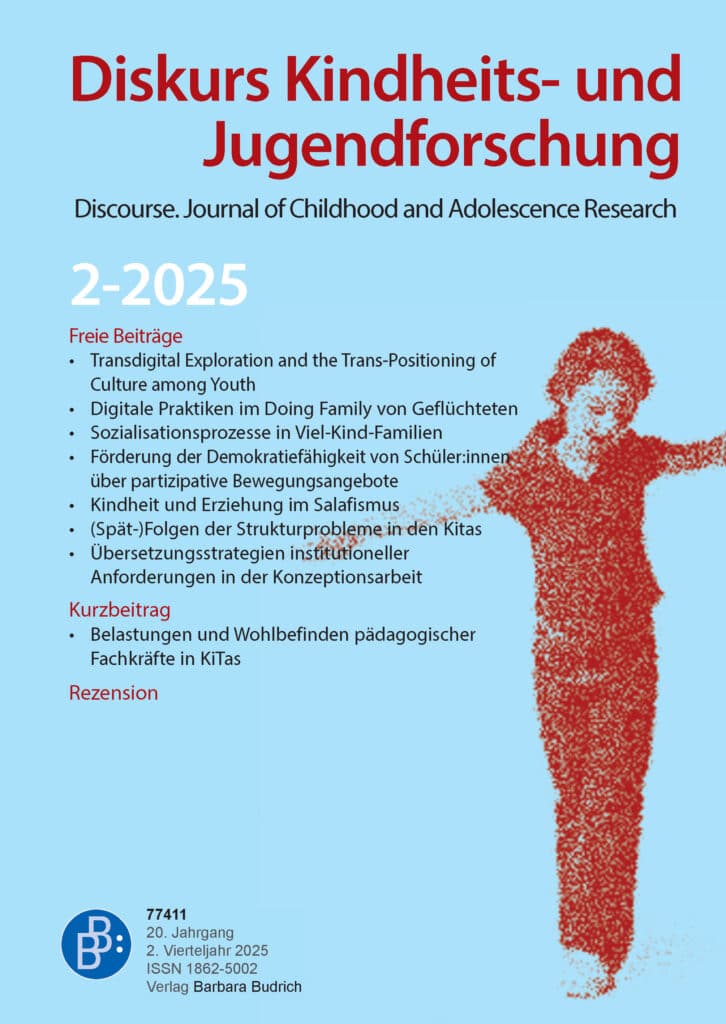
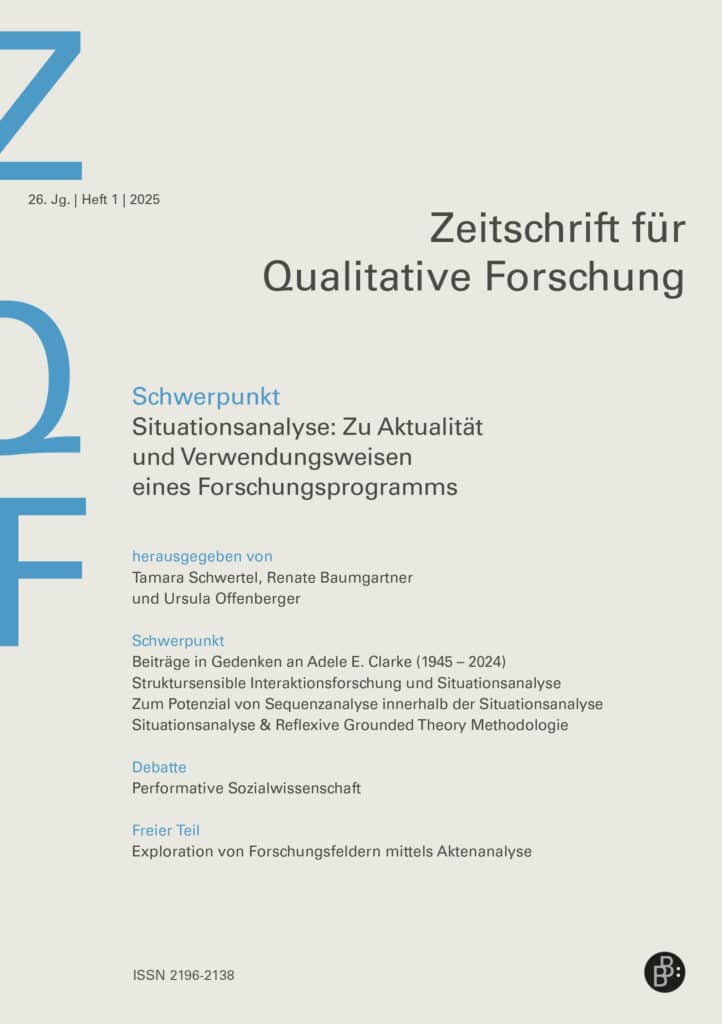
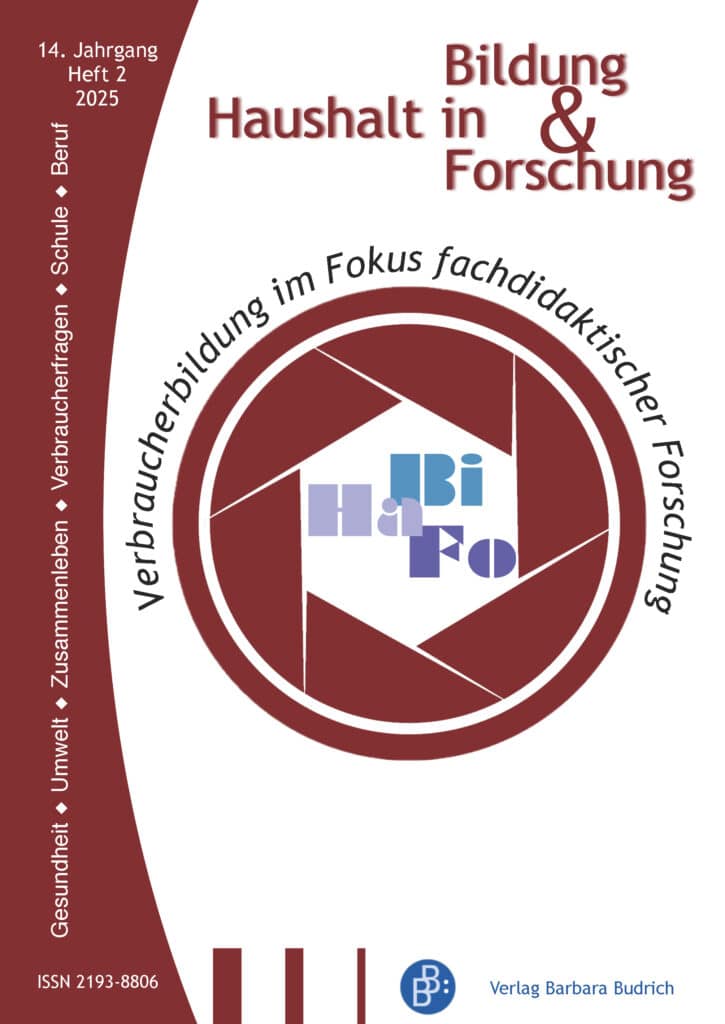
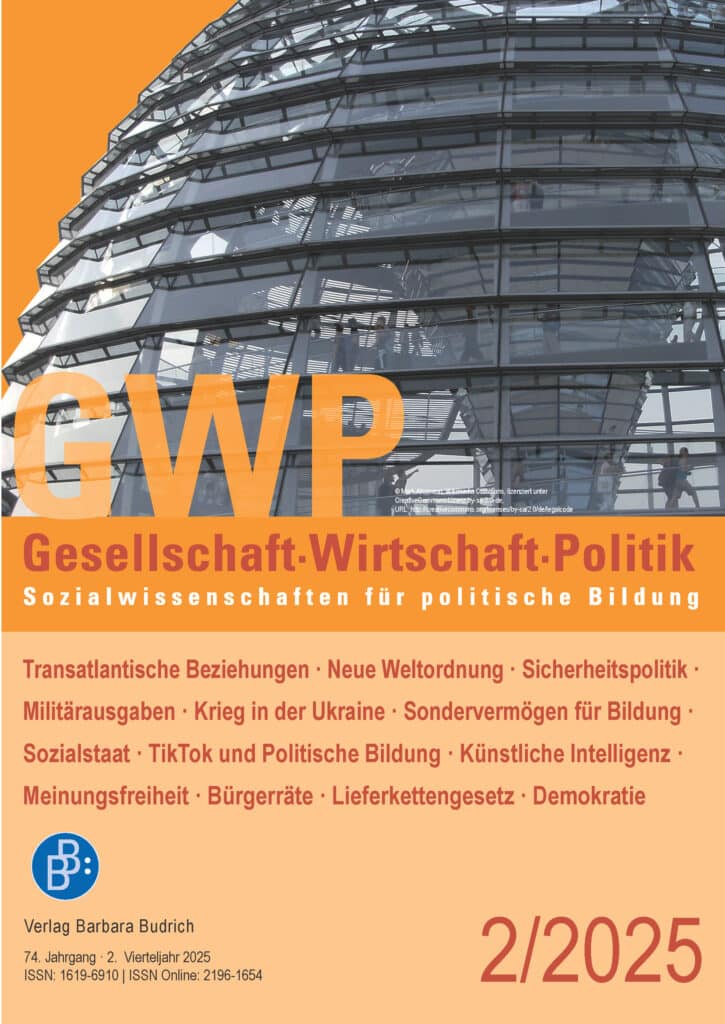
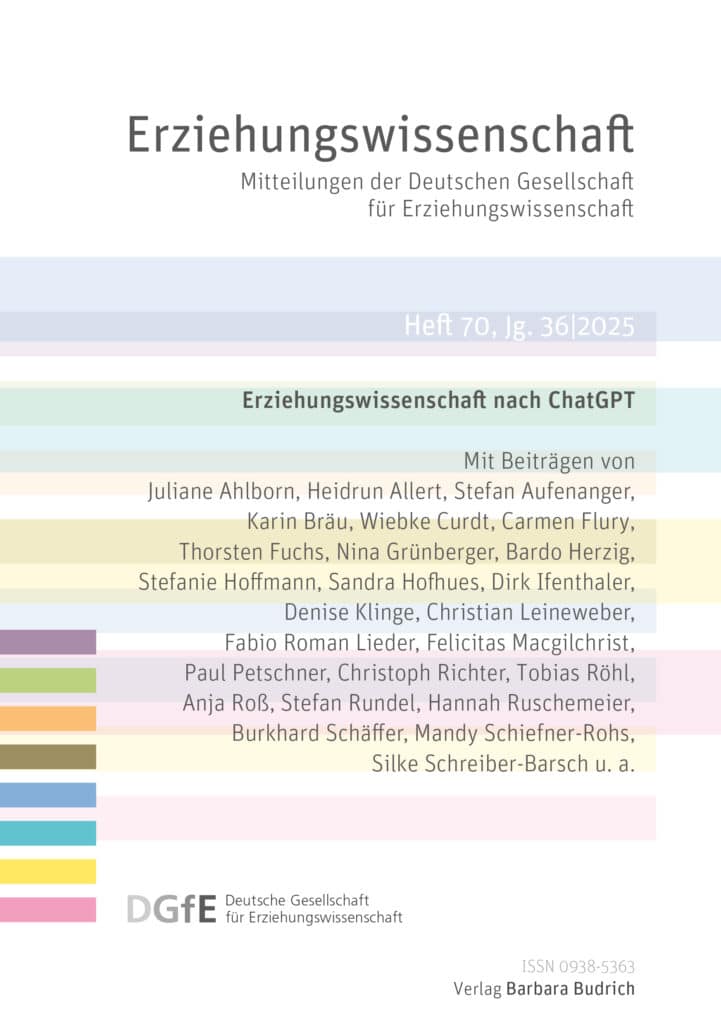


Bewertungen
Es gibt noch keine Bewertungen.